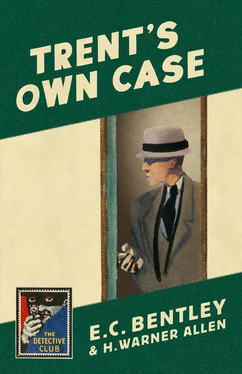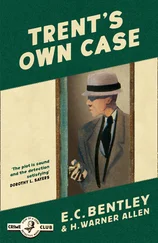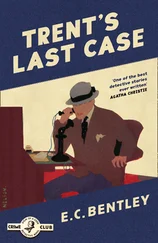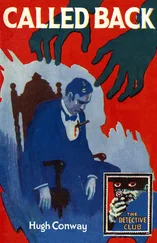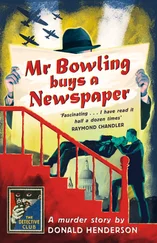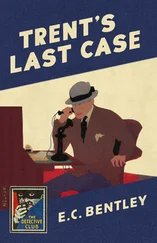As soon as he had finished his wine, he called on the waiter to clear the table at which he was sitting alone. The table clear, he planted on it his kit-bag and opened it. Miss Yates observed that on the top of its contents lay a number of paper packages, each secured with an elastic band; and of these the man proceeded to make one compact parcel, wrapped in a sheet of newspaper and tied with string. Replacing this in the bag, he next took from it a handful of sheets of paper, which he laid on the table before him.
Snapping the bag as if he was shutting up in it a guilty secret, he turned to writing busily in pencil. From where she sat Miss Judith could follow the ebb and flow of his inspiration. He would cover some sheets with a big scrawling hand, then suddenly shake his head critically, and seem to begin all over again.
‘Can he be an author?’ Miss Yates asked herself. ‘But surely no one could compose at that rate. And he doesn’t look like a literary man. A journalist, perhaps—but would a journalist be in such a dither over his work? He may be preparing a speech—but then he looks like the kind of man who would always know what he wanted to say, and would say it in plain words.’
As Miss Yates toyed with these speculations, the man wrote on. At length, rejecting yet another draft, he paused and considered; then scribbled what appeared to be a much briefer document. As he threw down his pencil, his glance met that of Miss Yates: and the blue eyes seemed to look right through her, focussed on something far beyond. So, at least, she hoped; for she saw him shudder violently before she turned her gaze away, with a sense as if she were spying on something that she had no right to see.
Vaguely she looked round the carriage, and remarked that the passengers were preparing for the arrival at Newhaven. Some with a half-furtive air were stowing cigarettes or tobacco from their bags in their pockets, with a view to the eluding of the French Customs. Others even more shamefaced were gulping down tablets and cachets of the drugs guaranteed to defy the demon of seasickness.
Miss Yates began to follow their example and prepare for transit to the boat. She had no fear of seasickness and no tobacco to conceal, but she got ready her tickets and passport. Her eyes wandered back to the agitated traveller. He had folded his final copy and placed it in a long envelope. The rest of his writing he folded into a wad, which he thrust beneath the fastenings of the newspaper-covered packet that Miss Yates had already observed.
As the train drew up at the platform he was the first to leave the Pullman; and Miss Yates noticed that as he started from his chair a piece of thin paper was wafted from it, unseen by him, to the floor of the carriage. It was unmistakably a leaf torn from an engagement-block, being headed by a printed date in thick capitals, with pencilled jottings below. So much Miss Yates could not but notice as she bent to pick it up; but the man was already heading a stream of travellers passing out, and she saw nothing of him as she stepped to the platform.
‘But certainly,’ she thought, ‘he will be crossing to Dieppe, and I shall see him on the boat.’
There, indeed, he was, already striding rapidly up and down the upper deck on the starboard side. Miss Yates attended first to the stowing of her own hand luggage. The turmoil of cargo-shifting and the casting-off of moorings ended at length; the steamer began to plough its steady way towards France. It was then that Miss Yates approached the man who had so much engaged her sympathy.
‘When you left the train, sir,’ she said without any nervous preliminary, ‘you left this little sheet of paper which had fallen from your seat to the floor. I thought it might be something of importance, so I had better return it to you.’
The man gazed at her a little wildly; then at the leaf which she was holding out to him. His eyes narrowed as he examined it in the half-light of the deck lamps; then he looked away, his face contorted as if with fear or keen anxiety.
Suddenly he turned to Miss Yates squarely. ‘You have made a mistake, ma’am,’ he said, in a shaking voice. ‘Very kind indeed of you to take the trouble, but that paper is not mine. I never saw it before. Many thanks all the same.’ He jerked a bow at her and immediately resumed his uneasy pacing of the deck.
Miss Yates was naturally taken aback. Why the man should so reject her good offices she was unable to conceive. The paper had unquestionably fallen from his chair. More than that—she had seen him, with a perplexed and frowning brow, intently studying that very paper more than once during the progress of his writing. Indignation might have overcome her; but Miss Yates was one of those who will always find excuses for anyone seeming so distressed and overwrought as did this fellow-passenger. She felt the agreeable thrill of a mystery as she carefully tucked the disowned scrap of writing in a pocket of her handbag.
The voyagers, for the most part, settled themselves for the crossing in the saloons and cabins, for the night was wet and cold. Miss Yates, in a glow of freedom and adventure, was resolved to lose none of the sensations proper to travel; she preferred to seclude herself with a rug in the shelter of one of the boats. That end of the deck might well have appeared deserted to the man who had so aroused her interest, when next she saw him. Emerging from one of the deck-houses, he resumed his pacing to and fro; and she noted that he now carried the shapeless package under his arm. Soon he paused beside the rail; and he quitted it with a nervous start when one of the crew passed by on some errand.
A minute later, what Miss Yates was half-expecting happened. The mysterious traveller again approached the rail, and furtively dropped overboard whatever it was that he was carrying. That done, he disappeared below; and Miss Yates saw no more of him until the disembarkation at Dieppe. She noted that he was among the first to pass out of the Customs shed; but neither on the Paris train nor elsewhere did she again set eyes on the man who had so surprisingly disowned the little sheet of paper.
Not until half an hour later did Miss Yates, having savoured the pleasure of skimming the first French newspaper she had seen for many years, think again of the leaflet which she had tried to restore to its possessor. Turning from the lively polemics of the Homme Trompé , which she had found more than a little bewildering, she began to review the details of the puzzle which had so much intensified the happiness of her release from the daily round of life in Farnham. The scrap of paper, now! If its possessor chose to deny his right to it, it was surely for anybody’s reading.
Miss Yates drew the paper from her handbag and noted at once that it was headed by that same day’s date. But what she read next, in a firm and legible pencilling, gave her a surprise far more thrilling than she had yet known in the brief affair of the mysterious passenger to Dieppe.
Heads jerked round, and startled looks were turned upon the quiet little Englishwoman, as she exclaimed aloud: ‘Good gracious!’
CHAPTER III Contents Cover Title Page Copyright Introduction I. SOUTHWARD BOUND II. A LITTLE SHEET OF PAPER III. DEATH OF A PHILANTHROPIST IV. NOT HARD OF HEARING V. TRENT IS TAKEN ABACK VI. AN ARREST HAS BEEN MADE VII. ON A PLATE WITH PARSLEY ROUND IT VIII. THE WHITE FLOWER OF A BLAMELESS LIFE IX. THE TIARA OF MEGABYZUS X. A MATTER OF TEMPERAMENTS XI. IMPASSE XII. THE COUNT EXPLAINS XIII. FELIX POUBELLE 1884 XIV. GENIUS MUST LIVE XV. EUNICE MAKES A CLEAN BREAST OF IT XVI. THE WHISPERED WORD XVII. FINE BODY OF MEN XVIII. INFORMATION RECEIVED XIX. RESURRECTION XX. A GOLF MATCH XXI. AUNT JUDITH KNITS The Detective Story Club About the Publisher
Читать дальше
